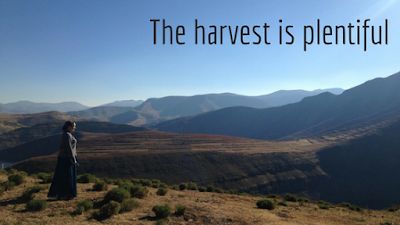The Harvest is Plentiful
 |
| "Kotulo e kholo ruri" (Sesotho) |
I once heard a friend describe his missions experience in the Philippines, and he told us that the harvest is plentiful there, in reference to Matthew 9. Jesus was teaching in all of the cities and villages, and the bible says that he had compassion for the people, because they were lost and helpless, "like sheep without a shepherd." He goes on to tell the disciples, "The harvest is plentiful, but the laborers are few; therefore pray earnestly to the Lord of the harvest to send out laborers into his harvest."
I had a vague understanding of the passage, and I knew there were unreached people groups out there; people who thirst and hunger for a truth that never runs out, seeking living water just like the woman at the well.
But when I arrived in the devastatingly beautiful country of Lesotho, I was given the opportunity to see the gospel come to life.
I don't know what first comes to your mind when you think of Africa. It could be rolling plans, with a giraffe galloping across the horizon. Maybe its villages of little huts, stuck in time, burning in the heat of the sun that never sets. It could even be a collection of wild animals performing musical numbers about the circle of life.
Lesotho, however, is known as the sky kingdom. It's lowest point rests above 1,000 ft, it's highest point well over 11,000 ft. For perspective, Denver, Colorado is around 5,000 ft and Orlando, Florida is 82 feet above sea level.
Nestled into the mountains of Lesotho, villages fill nooks and crannies, populated by a beautiful and merciful people, known as the Basotho. A king and chiefs still govern the people, along with a parliament that more or less functions.
The capital is a bustling city, similar to what may be found in Brazil, and the villages are largely agricultural, growing maize and wheat for food. The people also raise cattle, goats, sheep, donkeys, and horses. It's not uncommon to drive along the road and pass cattle traveling the same path, or a herdboy off to the side looking after a grazing herd. In the villages, children play and khonos (grannies) look on as they work, full of wisdom and kindness.
The culture of Lesotho is not all that different from that of Jews in biblical times, with traditions so mystifying it intrigues and draws you closer.
And so, our group of six arrived in the villages of Mohale Dam, in the Sinqunyane Valley, alongside two long-term missionaries, and our translator (who quickly became a dear friend).
We spent time relationship building, attempting to learn Sesotho and playing various games with children. I say attempting to learn, because it's a rather entertaining experience. Sesotho is an enchanting language, flowing like a river, including clicks my mouth struggles to formulate.
Conversations turn to laughter as our new friends patiently teach us, in turn laughing when we are given Sesotho names, as our counterparts struggle just as much with our English names. I was given the name Sithati.
After a time, and with permission from the Morena (Sesotho for "chief"), we begin to teach, sharing the gospel using passages such as the story of the prodigal son. People listened intently, some ask questions that catch you off guard, much like a child. Their earnestness revealed a seeking heart, a curiosity I have never witnessed.
Over the course of three days, I witnessed at least five individuals accept Christ, and many more were discipled; they learned to seek Christ for themselves and study his word.
But the Basotho people live in a culture of fear, involving ancestor worship and witch doctors. People rely on charms and good works to save them from evil spirits and earn right standing.
It's difficult to understand outside of the context of their culture and daily lives, but things happen in Africa that we cannot explain in the West.
But it was explained to me this way, when you have a headache, do you pray that God will heal it? Or do you reach into the medicine cabinet and grab some ibuprofen? We just as often rely on man-made remedies, what right do we have to judge a different culture?
But the Holy Spirit does not return void. The eyes of the people are being opened, and are ready to forsake the lies of the world in exchange for the truth of the Word.
While we were in the village of Ha Kokolia, we witnessed the Holy Spirit awaken hearts in front of us. I've been asked my favorite memory from the trip, and that day absolutely encompasses why my heart remains in Africa.
A blind man heard the gospel from the missionaries while in a different village, and he received a proclaimer (audio bible). He became a believer, and brought the gospel back with him to his home village. Many others heard the gospel as he listened to the bible. And so, when we arrived and shared the gospel, they were already ready to turn their lives over to Christ. It had nothing to do with us or what we had to offer, but what God had already been at work doing.
The people of Lesotho are unreached not because they don't want the gospel, but because no one is willing to go.
And so, my prayer is that God will raise up spiritual leaders in Lesotho.
I pray over Isaiah 6, similar to biblical times, God is asking who will go to his people.
My heart aches in ways that can't be explained for the people of Lesotho, and I desire that God would send me. Who else will go? Who will pray? I rest in the knowledge that there is unimaginable power in the name of Jesus.
If you have questions or want to talk about Lesotho, I would love to get coffee with you. I don't write this because I know everything or can speak from any place of authority. But I write from a place of passion and love for the people God has burdened my heart for.



Comments
Post a Comment